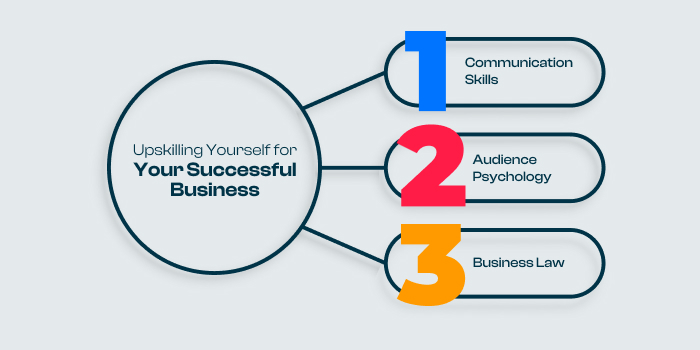Higher education is pivotal in equipping entrepreneurs with the knowledge and skills necessary to thrive in today’s competitive business landscape. As small business owners navigate the complexities of running a business, a strong educational background can provide a solid foundation for overcoming challenges and fostering long-term success. This article presents an overview of various degrees that provide entrepreneurs with a well-rounded skillset for success on their entrepreneurial journeys.
Business And Management Degrees
A. Bachelor Of Business Administration (Bba)
This degree offers an in-depth knowledge of fundamental business concepts, including finance, marketing, management, and organizational behavior. This degree program helps entrepreneurs build a solid knowledge base, enabling them to tackle various business challenges confidently.
BBA programs also focus on honing critical thinking, problem-solving, and decision-making skills crucial to developing business acumen. As small business owners constantly make crucial decisions, these skills are invaluable in navigating the entrepreneurial landscape.
B. Master’s In Business Administration (Mba)
MBA programs often offer specialized tracks in entrepreneurship and small business management that delve deeper into the unique challenges and opportunities small business owners face. These specializations provide tailored knowledge and tools to manage small businesses more effectively and efficiently.
One of the greatest advantages of earning an MBA degree is the networking opportunities it affords. MBA programs bring together like-minded individuals from diverse backgrounds, giving small business owners an excellent chance to expand their professional networks while benefiting from learning from others’ experiences.
C. Master Of Communication Management Program (Mcm)
The master of communication management program can equip entrepreneurs with effective communication and leadership skills – essential components for running any small business successfully. The curriculum covers various forms of communication, such as public relations, marketing communication, and crisis management, to give entrepreneurs the tools needed to manage their brands and interact with stakeholders effectively.
Finance And Accounting Degrees
A. Bachelor’s In Finance Or Accounting
A bachelor’s degree in finance or accounting equips small business owners with essential financial management skills. These skills include understanding financial statements, analyzing cash flow, and managing working capital. By mastering these concepts, entrepreneurs can make better decisions regarding their company’s financial health and long-term sustainability.
Effective budgeting and forecasting are crucial for small business owners to plan for the future and allocate resources efficiently. A Finance or Accounting degree provides the necessary knowledge to create accurate financial projections, anticipate future expenses, and monitor the budget to ensure profitability.
B. Certified Public Accountant (CPA)
A CPA designation demonstrates expertise in tax planning and compliance. Small business owners with a CPA background can navigate complex tax laws, identify potential deductions, and ensure compliance with local, state, and federal regulations. Entrepreneurs can avoid potential penalties and maximize their business’s bottom line by effectively managing tax obligations.
CPA-certified small business owners possess the skills to conduct internal audits and prepare accurate financial reports. These abilities are essential for monitoring the financial health of a business, ensuring transparency, and building trust with stakeholders. By maintaining accurate financial records, small business owners can make well-informed decisions and identify growth opportunities.
Marketing Degrees
A. Bachelor’s In Marketing
A bachelor’s in marketing equips small business owners with the tools to conduct market research and analyze consumer behavior. By understanding their target audience and competitors, entrepreneurs can tailor their offerings to meet customer needs and differentiate themselves in the market.
Marketing degrees also focus on crafting effective branding and promotion strategies, empowering small business owners to establish strong brand identities and implement marketing campaigns that drive customer engagement and sales.
B. Master’s In Digital Marketing
A Master of Digital Marketing provides small business owners with access to an understanding of online marketing channels such as search engine optimization (SEO), pay-per-click advertising (PPC), email marketing, and more – giving them a strong advantage in reaching out to target audiences and generating leads through these digital platforms.
Technology And IT Degrees
A. Bachelor’s In Information Technology/Computer Science
A degree in Information Technology or Computer Science provides small business owners with the knowledge to set up and maintain their digital infrastructure and ensure data security. Entrepreneurs can protect their businesses from threats by understanding the latest technological advancements and cybersecurity best practices.
These degrees also cover software and application development, enabling small business owners to create custom solutions that streamline operations, improve customer experience, and drive growth.
B. Master’s In Data Science Or Analytics
A master’s degree in data science or analytics empowers small business owners to use data to gain valuable insights into their business’s performance. Entrepreneurs can make informed decisions that drive growth and improve profitability by analyzing customer behavior, sales trends, and operational efficiency.
Small business owners can optimize their operations and decision-making processes with data-driven insights. It might include identifying inefficiencies, automating tasks, or implementing new strategies to enhance customer satisfaction and boost revenue. A data-savvy entrepreneur is better equipped to navigate the competitive landscape and achieve long-term success.
Industry-Specific Degrees
Selecting an industry-specific degree allows small business owners to tailor their education to match their unique business niche. By focusing on the specialized knowledge and skills relevant to your chosen field, you can gain a competitive edge and enhance your ability to tackle industry-specific challenges.
Examples Of Industry-Specific Degrees
- Bachelors in Fashion Merchandising: Ideal for boutique owners, this degree teaches essential skills in fashion trends, product development, and retail management.
- Bachelors in hospitality management: Restaurant and hotel entrepreneurs can benefit from learning about customer service, operations, and marketing strategies specific to the hospitality industry.
- Bachelor in environmental science: For eco-friendly businesses, a degree in environmental science can help owners understand sustainable practices and incorporate them into their business model.
Upskilling Yourself for Your Successful Business

Now that you know the degrees you will need for a successful business, it is extremely easy to feel overwhelmed.
To begin with, if you are planning to start a business, it won’t be possible to get all the degrees.
Even if you plan to do so, the most you can do is a bachelor’s or master’s degree before you finally begin your journey.
This is one of the reasons why upskilling yourself with other soft skills can sometimes be even more important than getting a degree.
1. Communication Skills
Your presentation and elocution should be top-notch when opening a business. It might not seem like a big deal right now, but you should always think about the next step.
You will need to present your business to investors.
Then, you will need to do the same to pursue new employees.
Finally, you are starting your journey as a leader. It is inevitable that you will be required to motivate others to believe in the business.
Therefore, the first thing you need to do is get a grasp on a language which will be your primary mode of communication. Then you start with the presentation part of it.
You won’t be able to conquer the same in a day or even a week, but giving one hour towards the skill every day will make you a master in no time.
2. Audience Psychology
Business and psychology are two vastly different subjects. Although an MBA degree does entail understanding behavior, you only manage to scratch the surface.
It is better to get an in-depth knowledge about audience psychology. This will help you understand your target audience, what they like, what they don’t etc.
Basically, how to bring your audience towards your business, and not the other way around.
Yes, as you open your business, you will understand these items better with experience, but it never hurts to have a little extra knowledge.
3. Business Law
Understanding business law when starting a business is important because it helps you follow the rules.
You need to know how to register your business properly and get any permits you might need. Knowing about contracts and how they work keeps you safe if you deal with others.
It also helps you hire people fairly and treat them well. Plus, it ensures you’re not breaking any laws that could get you in trouble. Understanding business law keeps your business safe, fair, and trusted, which sets you up for success in the long run.
Conclusion
In summary, various degrees offer valuable knowledge and skills for small business owners, including business and management degrees (BBA, MBA, MCM), finance and accounting programs, marketing degrees, technology, and IT degrees, and industry-specific degrees tailored to your unique business niche. Embracing lifelong learning and professional development is crucial for small business owners to adapt to the ever-changing business landscape. By continually upgrading your skills and staying current with industry trends, you will enhance your business’s success and foster personal growth as an entrepreneur.
Read Also:
















